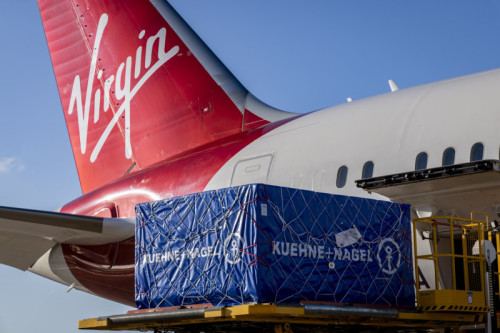K+N ships cargo on 100% SAF powered transatlantic flight
30 / 11 / 2023

© 2023 Kuehne+Nagel. All rights reserved.
A Kuehne+Nagel (K+N) shipment was onboard the first ever commercial transatlantic flight 100% powered by sustainable aviation fuel (SAF) earlier this week.
The flight hit the headlines on November 29 when a Virgin Atlantic Boeing 787 Dreamliner was filled with 50 tonnes of SAF for its journey between London Heathrow to JFK Airport in New York.
Forwarder K+N said that as part of its efforts to reduce emissions, it had secured the available cargo space on the flight and utilised the corresponding amount of SAF for the transported goods.
Yngve Ruud, member of the management board of K+N responsible for air logistics, said: “This is a historic moment in our collective journey towards sustainable aviation and we are very proud to represent the air cargo industry on the world’s first 100% Sustainable Aviation Fuel transatlantic flight by a commercial airline.
“It is an honour to support this Virgin Atlantic-led consortium, pushing the boundaries of decarbonisation in aviation.”
The SAF used to power the two Rolls-Royce Trent 1000 engines on the 787 is produced by Hydroprocessed Esters and Fatty Acids (HEFA) (waste fat) and Synthetic Aromatic Kerosine (SAK) (waste from corn production) at an 88% SAF and 12% SAK blend ratio.
“Kuehne+Nagel is committed to the science-based targets to decarbonise the logistics sector and drive the change towards a zero-carbon future,” the forwarder added. “This flight represents the next step in sustainable aviation by demonstrating the potential of using SAF as a 100% drop-in replacement for fossil fuel.”
The Virgin Atlantic-led consortium is joint funded by the UK Department for Transport and includes Rolls Royce, Boeing, University of Sheffield, Imperial College London, and Rocky Mountain Institute.
The flight comes just days before the COP 28 environmental summit with industries potentially facing stricter environmental regulations jockeying to prove their carbon reduction credentials.
On the aviation front, member countries of UN aviation body ICAO last week agreed to target a 5% reduction in CO2 emissions generated by aviation compared to current fossil fuels by 2030.
The target includes a “collective vision” for green energy transition, harmonised regulatory foundations, supporting implementation initiatives, and improved access to financing for related initiatives so that “no country is left behind”.
The target will be achieved through a transition to SAF, lower carbon aviation fuels (LCAF), and other cleaner energies.













